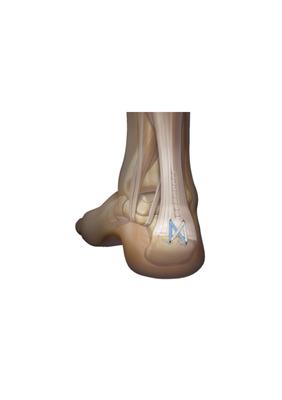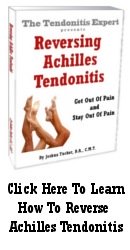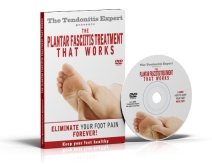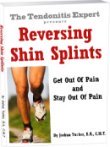Concerned about strength after recovery from Achilles Sugery
by William
(London, England)

View of Achilles Reattachment
Hi everyone.
Thank you for sharing your experiences and guidance, I am able to look forward to my recovery more usefully and am going to be careful and work on the supporting muscles as I get back to full activity.
I am a 38 year old Theatre teacher who loves to cycle and plays Capoeira. I have two boys aged 2 and 4 and very supportive Wife.
I have been suffering with the pain for many years and was unable to run or jump without injuring my Achilles, although I am extremely physically active in ways which did not aggravate my heel. Day to day I could get by but conservative treatments did not help me and I decided to go for the full operation.
I had surgery for a right Haglund’s deformity excision and Achilles tendon reattachment. After the spur was removed my far lateral Achilles tendon was preserved and the remainder was reattached using the Arthrex speedbridge suture anchor system.
I had the surgery on 10/14/2016 and am 4 days out now. I have been relatively pain free and I think this is because I have spent a great deal of my time lying down with my foot elevated.
I have a knee walker that makes getting around the house quicker and prevents too much blood rushing to my ankle while upright.
Today a shower chair, stool and cast cover shall arrive so I may wash properly.
I have been keeping a drugs chart and recovery diary.
I have begun taking Magnesium supplements for my bone repair.
Questions
1. I am booked in for a check up two weeks after my surgery where I presume my back slab will be taken off, my wound checked and a rigid cast or boot put on.
2. If I fitted for a cast should I request that it protrudes out under the toes to prevent contact with the floor? As it's the bending of the toes up that pulls on the plantar tendon which then pulls on the Achilles.
3. I really want to be able to cycle again at full power but am worried about re-injuring myself, has anyone got back to their old levels successfully?
4. My surgery fell on the last day of term before a two week holiday and I have warned my school that I might be off for another 2 weeks after the new term begins. Do you think this is enough? My job is as active as I make it but there is a lot of moving around the campus.
Once again thank you for your open discussions and may I wish everyone the best of luck with their journeys.
----
Joshua Answers:
Hi William.
2. I wouldn't. You want to keep some movement happening.
Immobilization is bad for muscle structures.
Yes you want to keep this still to help the achilles heal/reattach, but you want to keep muscle fibers firing/moving (even just in the confines of a hard cast).
If you're worried about it, sure do that with the cast. Better safe than sorry (but you'll have to do more rehab later to make up for it).
Remember, the components of the
- too tight muscle and connective tissue
- chronic inflammation
- nutritional lack
See: What Is Tendonitis?
Also....that tightness etc is what caused all this in the first place.
So again if you want to totally immobilize things that's ok, but A. you'll have to makeup for it later and B. I'd still do regular tiny motions of toe and ankle in all directions inside the confines of the cast to keep muscles firing/signal going to the brain and back.
If you didn't have Achilles Tendonitis before (you had all the factors in play, so you did), you do now (have all the factors in play, only more so).
3. If you're worried about reinjuring yourself, you need to reverse the (still existing) factors that caused the problem in the first place.
I recommend the Reversing Achilles Tendonitis program for your rehab.
Faster and better recovery while in the cast, and after. It's great you're taking Magnesium (if you're taking enough, and the right kind).
Are you doing any other nutritional supplementation?
Don't expect time and some 'stretching and strengthening' in physical therapy to get you back to as good as new. It doesn't work that way.
It will get you back on the bike (maybe, probably), etc, but it won't fix the underlying factors that caused all this, and will continue to try to maintain it and cause it again.
Said another way, you will, by default, recover to a large degree. But if you want to recover and rehab to 'as optimal as possible', then you'll need to work on that using more than what you'll get from your doctor (which probably is very, very minimal).
It's certainly possible to get back to old levels or relatively close to it with whatever post-surgery care your doctor prescribes for you, but maintaining it and staying pain/problem free...that's the real goal.
4. 4 weeks post surgery....you should be ok back to work. But you'll likely be limited and not be wanting to get around as much as you'd like to be, by a large degree.
Cutting into bone (and resulting Bone Bruise/a>, major achilles damage, etc. You've got some recovery to do.
A month isn't that long a time, especially when a bunch of it is going to be in a cast etc.
See Related: Achilles Tendonosis Surgery And Bone Spur Debridement Happy And Ready To Do It Again
See Related: Achlles Tendonitis Surgery Two Years Ago Still Healing
----------------------
Please reply using the comment link below. Do not submit a new submission to answer/reply, it's too hard for me to find where it's supposed to go.
And, comments have a 3,000 character limit so you may have to comment twice.
-----------------------

Joshua Tucker, B.A., C.M.T.
The Tendonitis Expert
www.TendonitisExpert.com
| |
| Share Your Story Achilles Tendonitis Surgery Stories Carpal Tunnel Surgery Stories Plantar Fasciitis Surgery Stories Nerve Conduction Test Stories Share YOUR stories (and horror stories!). |


